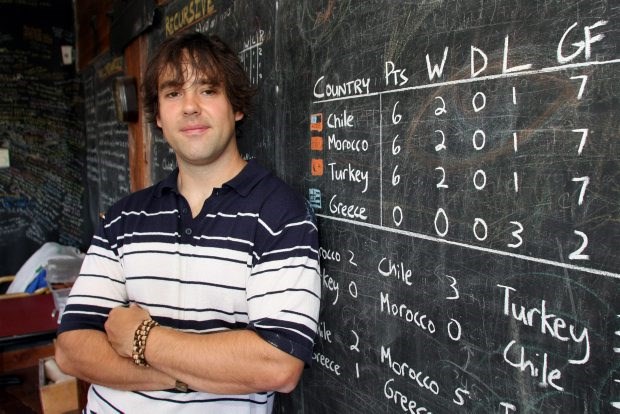When Aaron Williams approached me with an exclusive story that had international sports appeal, I got fired up. The excitement turned to fear when Williams started to explain the fault he'd discovered in the FIFA World Cup 2010 soccer rules.
You see, Williams, 32, has a PhD in mathematics and computer science. The walls of his apartment are chalkboards covered in type-sized number formulas looking them made my head spin. Luckily, he is a good communicator and very patient. He explained the problem to me in a way I could share with others: In the instance of ties, there are scenarios in the soccer rulebook where two teams could claim they are eligible to advance to the same position because the language is unclear.
Millions of dollars and national pride (and safety) are at stake in the World Cup tournament. While FIFA, the sports governing body, responded dismissively, Williams was interviewed by news, sports and academic media about his discovery.
This was my most memorable story this year because it demanded mental gymnastics in the art of explanatory storytelling, and it reminded me of the value in looking at the world through the lenses of others with specialized perspectives like mathematics.
Victoria Mathematician Finds Flaw in FIFA World Cup Rules
Date published: July 12, 2009
Victoria mathematician Aaron Williams has discovered what he says is a "potentially disastrous" fault in international soccer rules for breaking three-way ties -- something that could wreak havoc at next year's 2010 World Cup tournament in Johannesburg.
Two different teams could make a logical argument for a second-place ranking in a three-way tie for first place, depending on how the guidelines are followed, said Williams, 31, who holds a master's degree in math and will defend his PhD in computer science this fall. "In a particular round-robin situation, three teams could argue they finished in the top-two spots based on the rules as they're written."
When he presented the problem to a third-year undergraduate logic class at the University of Victoria, he used the countries Chile, Morocco and Turkey in an example, and had the students go through the tie-breaking rules to rank the teams in order.
The 32 teams in the World Cup are initially divided into eight groups of four. Teams play games against each of the other countries in their group, with the top two advancing to the next round of the tournament.
Imagine each of the three countries has won two games. According to the Fédération Internationale de Football Association (FIFA) rulebook, Chile would be in the top spot because it scored the most goals in Williams's scenario.
The difficulty comes in determining who would be in the number-two spot, because of disagreements over how the tie-breaking criteria are applied.
"Do you continue breaking the tie as if three teams are involved, or now approach it as a two-way tie and apply the tie-breakers in order?" said Williams. "The language is ambiguous and the remaining two teams have logical grounds to argue for second place -- which could get very messy in an already charged environment like the World Cup."
In fact, when the scenario was presented to two different authorities, they came up with different responses. FIFA representatives contacted by the Times Colonist named Turkey as the second-place winner under the scenario outlined.
However, when the Times Colonist presented the query to Joe Guest, director of refereeing for the Canadian Soccer Association, his initial response was to declare Morocco the winner. "If Chile advanced, then it's a contest between the next two and the most points between them," he said.
He said scenarios such as these are often dealt with before they reach the tournament phase. Nonetheless, Williams raises a "great question," he said. "There is a lot of money involved at this level of the game and the teams are very high-profile around the world. That's why FIFA has the experts to interpret the rules -- these kinds of things can absolutely spark public outcry."
Williams said he is not satisfied with FIFA's response.
"Regardless of which team would advance by FIFA's ruling, the eliminated team would have logical grounds for an official protest.
"FIFA should do the right thing and eliminate the ambiguity from the rules before it leads to an embarrassing -- and potentially riotous -- situation."
